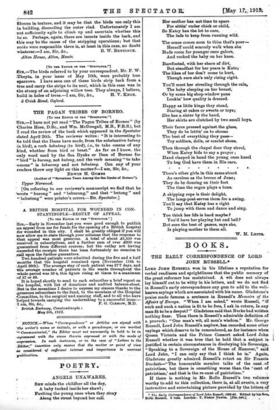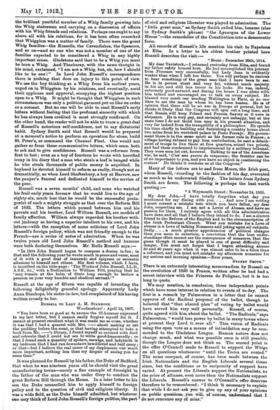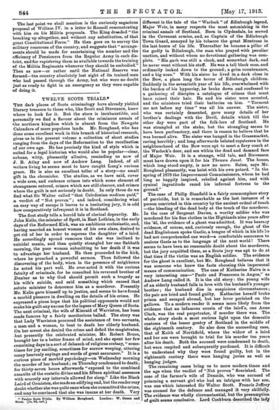BOOKS.
THE EARLY CORRESPONDENCE OF LORD JOHN RUSSELL.* LORD JOHN RUSSELL won in his• lifetime a reputation for verbal readiness and sprightliness that the public memory of the great reformer has maintained. A wit does not always lay himself out to be witty in his letters, and we do not find in Russell's early correspondence any gem to add to the well- known sayings which are associated with his name. Gladstone's praise made famous a sentence in Russell's Memoirs of the .dfairg of Europe. "When I am asked," wrote Russell, "if such and such a nation is fit to be free. I ask in return, Is any man fit to be a despot? " Gladstone said that Burke had written nothing finer. Then there is Russell's admirable definition of a proverb : "One man's wit, all men's wisdom." Mr. George Russell, Lord John Russell's nephew, has recorded some other sayings which deserve to be remembered, as for instance when Queen Victoria and the Prince Consort asked. Lord John t Russell whether it was true that be held that a subject is justified in certain circumstances in disobeying his Sovereign. " Speaking to a Sovereign of the House of Hanover," said Lord John, "I can only say that I think he is." Again, Gladstone greatly admired Russell's retort on Sir Francis Burdett—" The honourable member talks of the cant. ,of patriotism, but there is something worse than the ' cant of patriotism,' and that is the re-cant of patriotism."
If there is nothing in Mr. Rollo Russell's two volumes worthy to add to this collection, there is, at all events, a very instructive and entertaining picture provided by the letters of • The Early Correspondence. of Lord John Hassell, 1805-40. Edited by his Son, Rollo RasselL 2 vols. London : T. Fisher Unarm. 1218. net.j
the brilliant youthful member of a Whig family growing into the Whig statesman and carrying on a discussion of affairs with his Whig friends and relations. Perhaps one ought to say above all with his relations, for it has been often remarked that Whiggism was a matter of family. There were the great Whig families—the Russells, the Cavendishes, the Spencers, and so on—and no one who was not a member of one of the families expected to be considered a Whig in any highly important sense. Gladstone said that to be a Whig you must be born a Whig. And Thaekeray, with the same thought in
his mind, exclaimed, "I am not a Whig, but, oh, how I should like to be one !" In Lord John Russell's correspondence there is nothing that does an injury to this point of view.
We see the boy thinking as a Whig from his earliest years, urged on in Whiggism by his relations, and eventually, amid their applause and approval, occupying the highest position
open to a Whig. It might be thought that Whiggism in such circumstances was only a political garment put on like an order or a coronet. But no one will be able to read Russell's early letters without feeling that the profound sincerity with which he has always been credited is most strongly confirmed. On the other hand, the reader will not be able to trace a great deal of Russell's notorious self-confidence, not to say dictatorial habit. Sydney Smith said that Russell would be prepared at a moment's notice to perform an operation for stone, build St. Peter's, or command the Channel Fleet. One would not gather so from these communicative letters, which seem both
to ask and to give confidences. Russell was a reformer from first to last ; even as a boy of fourteen he wrote with horrified irony in his diary that a man who steals a loaf is hanged while be who steals thousands of public money is acquitted. In boyhood he devoted himself to reform as really, though not so dramatically, as when Lord Shaftesbury, a boy at Harrow, saw
the pauper's funeral and dedicated himself to the service of
the poor.
Russell was a seven months' child, and none who watched
his frail early years foresaw that he would live to the age of eighty-six, much less that he would be the successful prota- gonist of such a mighty struggle as that over the Reform Bill of 1832. The letters which passed between him and his parents and his brother, Lord William Russell, are models of family affection. William always regarded his brother with- out jealousy as having a superior intellect to his own, and his letters—with the exception of some criticism of Lord John
Russell's foreign policy, which was not friendly enough to the French—are a series of notes of admiration. When he was twelve years old Lord John Russell's method and humour were both declaring themselves. Mr. Rollo Russell Bays:— "In 1804 John Russell began to compose a drama in fun ; in that and the following year he wrote much in prose and verse, most of it with a good deal of innuendo and epigram or sarcastic allusions to himself and others. His first volume, which I have, is inscribed on the title-page : The Works of John Russell, LL.D., A.S.S., 8:c.,' with a Dedication to William Pitt, praying that he `may remain at the helm of State long enough to bestow a pension on your very humble and obedient servant."
Russell at the age of fifteen was capable of inventing the following delightfully graceful apology. Apparently Lady
Anna Stanhope, his sister-in-law, had complained of his having written crossly to her.
RUSSELL TO LADY A. M. STANHOPE.
Woodnesboro' : April 12, 1807.
"You have been so good as to excuse the ill-humour expressed in my last letter, but I cannot easily forgive myself for it. I cannot at present recollect what it was made me so cross, whether it was that I had a quarrel with Mrs. — about making us eat the pudding before the meat, or that having attempted to take a book from Mr. —'s library, I found myself so covered with dust and cobwebs that I could not see to write good-humouredly ; or that I found such a quantity of spiders, earwigs, and ladybirds in my bedroom that I had run downstairs bewildered and half crazy ; or that—but I believe the real cause of my displeasure was much more important, nothing less than my despair of seeing you for some time."
It was planned for Russell by his father, the Duke of Bedford, that when he was nineteen years old he should visit the great manufacturing towns—surely a fine example of foresight in the father of the man who was under Grey to conduct the
great Reform Bill through the House. In a later letter to his son the Duke counselled him to apply himself to foreign policy and to the question of civil and religious liberty. It
was a wide field, as the Duke himself admitted, but whatever one may think of Lord John Russell's( foreign- politics, the part of civil and religious liberator was played to admiration. The "little great man," as Sydney Smith called him, became (also in Sydney Smith's phrase) "the Lycurgus of the Lower House "—the remodeller of the Constitution into a democratic form.
All records of Russell's life mention his visit to Napoleon at Elba. In a letter to his eldest brother printed here Russell describes the visit:— "Rome: December 29th, 1814.
My dear Tavistock,—I returned yesterday from Elba, and found my father safely housed here. Ho had accomplished the journey from Florence very successfully, but Lady Jane is evidently weaker than when I left her there. You will perhaps be curious to hear something of the great man that I have been to see. He is in person stout and very fat, without much majesty in his air, and still less terror in his looks. He was, in.deed,, extremely good-natured, and during the hours I was alone with him talked and encouraged me to talk on every subject. He blamed very much our sending Wellington to Paris, as no one likes to see the man by whom he has been beaten. He is of opinion that there will be no war in Europe at present, but he thinks it likely that the Congress will spin out a long time, and that Russia will keep Poland and Prussia Saxony as it were in abeyance. He is very gay, and certainly not unhappy, but at the same time I do not think him easy in his present situation, and very far indeed from the tranquillity of a philosopher. He spends his time chiefly in building and furnishing a country house about two miles from his wretched palace in Porto Ferrajo. His govern- ment there is in the same spirit as his former rule in France; a village having refused to pay him contribution, he sent a detach- ment of troops to live there at free quarters, seized two priests, and had them condemned to imprisonment by a military tribunal. They were soon let out, however. Talking to me of the American war, he said, ` C'est une guerre de vengeance; the frontier can be of no importance to you, and you have no object in continuing the contest.' He thinks it weakens us at the Congress."
Many of the letters are to and from Moore, the Irish poet, whom Russell, :-.ccording to the fashion of his day, overrated as much as he underrated Shelley. The letters from Sydney Smith are fewer. The following is perhaps the best worth quoting :—
" 3 Weymouth Street : November 24, 1835.
My dear John,—I have totally forgotten what day you mentioned for ray dining with you. . . . And now I am writing I must correct a mistake into which you have fallen, my dear John, respecting me. I am not a Lover of Abuses, and have no passion for them. I entirely agree with all this administration have done and all that I believe they intend to do. I am a sincere friend to the Reform of the English and to the circumscription of the Irish Protestant Church. What you mistake for a Love of abuses is a Love of talking Nonsense and joking upon all subjects. 2ndly . . . a much greater apprehension of political changes than you seem to entertain, a conviction that the best under- standings often cannot see the consequence of measures, that the game though it must be played is one of great difficulty and danger, You must not forget that I began attacking abuses 30 and 40 years ago when it was almost safer to be a felon than a reformer, and you must not mistake my afternoon nonsense for my serious and morning opinions.—Ever yours, SYDNEY Surria."
There is an extremely interesting memorandum by Russell on the revolution of 1830 in France, written after he had had a secret interview with the Princess de Polignac, but it is too long to quote.
We may mention, in conclusion, three independent points which have some interest in relation to events of to-day. The first is a remark by Palmerston in a letter that he cannot approve of the Radical proposal of the ballot, though he
believed that " that absurd plan" of voting by ballot would have served him very well personally. Russell, of course, quite agreed with him about the ballot. " The Radicals," says Palmerston, " would lose power by ballot in many towns where at present they Lord it over all." This vision of Radicals
using the open vote as a means of intimidation may be com- mended to the Gladstone League. Human nature does not change much, and what was possible once is still possible,
though the League does not think so. The second point is the offer O'Connell made to Russell to support the Whigs on all questions whatsoever " until the Tories are routed." The same compact, of course, has been made between the Irish Nationalists and the English Liberals several times since, but the conditions as to reciprocity of support have varied. At present the Liberals support the Nationalists, as the price of alliance, even more than the Nationalists support the Liberals. Russell's answer to O'Connell's offer deserves therefore to be remembered : "I think it necessary to explain that while I do not ask you to give up any of your opinions on public questions, you will, of course, understand that I do not renounce any of mine."
• The last point we shall mention is the curiously sagacious proposal of William IV. in a letter to Russell remonstrating with him on his Militia proposals. The King dreaded " the breaking up altogether, and without any substitution, of that great Constitutional Force." He then goes on to survey the military resources of the country, and suggests that " arrange- mente.should be made for ascertaining the number and the efficiency of Pensioners from the Regular Army iu each dis- trict, and for registering them as available towards the training of the Militia Regiments whenever they should be embodied." Then as now—or rather until the National Reserve was formed—the country absolutely lost sight of its . trained men who had passed through the Army, but who were no doubt just as ready to fight in an emergency as they were capable of doing it.












































 Previous page
Previous page